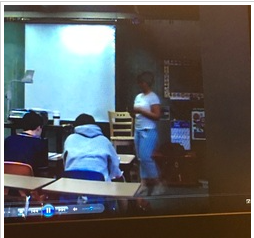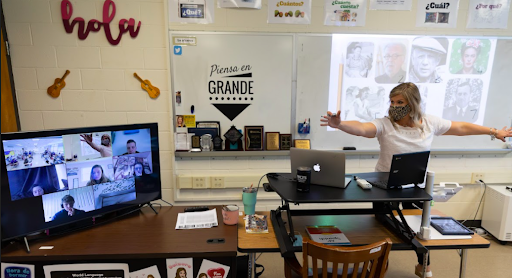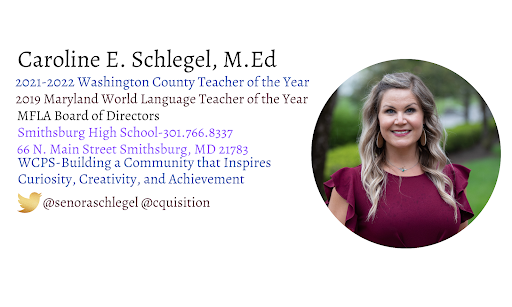How Language Proficiency Training Transformed My Teaching
By: Caroline E. Schlegel, M.Ed.
I was going through my desk drawer the other day and came across a lesson I had video-recorded my first year teaching. HOLY GUACAMOLE! What was I wearing and why was my hair so short?! Also – what was I actually doing? I was standing in front of the class, played a recording of a story in Spanish, gave the kids 30 seconds to look over the comprehension questions, and then I asked the questions aloud eliciting a response from a group of reluctant high school sophomores.
This 15-year veteran is looking at that young teacher thinking: How is this story relevant to the lives of my students? Where is the wait time? Why did I not give them more than one pass at the story? Why didn’t I offer a chance for students to interpret meaning from the story on their own? Why didn’t I provide scaffolds to assist in understanding vocabulary? Why didn’t we do something after this to extend our learning? It was a straight interpretive, mechanical-esque activity. At that point in my career, I had an overhead projector and green chalkboard; I taught straight from the book with only the ancillary

My first year in the classroom.
materials provided to me from the hodge-podge left-overs the teacher before me left. I won’t lie, for that year this was my lifeline: verb charts, explicit grammar instruction, vocabulary lists, and essential skills taught in isolation. Thirty-six-year-old me wants to go back and save twenty-one-year-old me (and my students) from that lesson.
This 15-year veteran is looking at that young teacher thinking: How is this story relevant to the lives of my students? Where is the wait time? Why did I not give them more than one pass at the story? Why didn’t I offer a chance for students to interpret meaning from the story on their own? Why didn’t I provide scaffolds to assist in understanding vocabulary? Why didn’t we do something after this to extend our learning? It was a straight interpretive, mechanical-esque activity. At that point in my career, I had an overhead projector and green chalkboard; I taught straight from the book with only the ancillary materials provided to me from the hodge-podge left-overs the teacher before me left. I won’t lie, for that year this was my lifeline: verb charts, explicit grammar instruction, vocabulary lists, and essential skills taught in isolation. Thirty-six-year-old me wants to go back and save twenty-one-year-old me (and my students) from that lesson
Transforming Language Learning Into Living Language
In my classroom, my proficiency as a language teacher has grown leaps and bounds. Language learning is not about answering comprehension questions, conjugating verbs, responding to multiple-choice questions, or translating. It is about discovering, understanding, and using the language in natural and organic contexts. It is about traveling, exploring cultures, understanding the lives of others, appreciating diversity, and using those experiences to inform the way you live, what you do, and how you connect with others.
Nothing is more satisfying as a language teacher than watching your students’ proficiency develop over time. Between exposure to music, culture, news, history, people, and the learning experiences we share over the years, I am fascinated by my students’ ability to engage, interpret, acquire, and use language. In Maryland, we recognize the importance of language and culture as it relates to not only communication but to global competency. As such, the Maryland Seal of Biliteracy is awarded to our students who rate at an Intermediate-High proficiency in their second language. We use the Avant Stamp 4S (Reading, Writing, Listening, and Speaking) assessment to identify students who meet this criteria.
The shift to a proficiency-based, culturally-minded approach is critical to language learning and teaching. Planning meaningful learning experiences by using authentic resources and language, as it occurs naturally in the world around us, is critical to engaging students in the language and fostering their motivation to understand. This was the shift of my career. I am better for it and my students can do more with the language because of it.
Shifting towards a proficiency mindset gives learners permission to enjoy the process. Rating my students on a proficiency scale highlights their strengths and showcases their abilities. My colleague, Aubrey Swisher, and I worked together to develop a means of self-reflection for our students- we call it “Feedback and Feedforward.” Whereas, our students take a critical look at their work and reflect on their own journey towards advancing their proficiency. Insert Avant’s tools. The Scoring Rubric provides specific feedback to their ability level and the Student Power Up Guide allows students to self-assess their own learning and reflect on how to grow.
My Students Are Better Because I’m Better
Recently, my supervisor Paula Moore gave all language teachers in Washington County the opportunity to participate in the Avant ADVANCE professional development course. I love that she believes in the power of teaching for proficiency and supports us as language educators to grow in our own capacity. Although I am versed in the national proficiency standards, this training gave me an opportunity to take a critical look at the way I assess my students and helped me to understand the differences between the intermediate levels and what makes writing jump to the advanced level. Having concrete evidence and examples allows me to remain consistent with what guidance I offer and how to accurately assess my students’ proficiency levels.

My 15th year in the classroom.
It has also assisted our department across the county in aligning our grading so that our students receive the most consistent feedback possible in all languages and all levels. What I love about the ADVANCE training is that during the modules, it provided reasoning as to why a student sample was or was not a certain proficiency level. This guidance gives teachers a better understanding of the subtle nuances that propel students forward or retain students at a particular proficiency level.
District-wide, we are using the Avant ADVANCE training as a means of vertical articulation. We collaboratively score and converse about our reasoning using the Avant Assessment Rater – Overview of Levels. These conversations ensure teacher scoring accuracy, accountability, and reliability as we seek to accelerate student learning in the midst of a global pandemic. Providing quality feedback is equally as important as the quality of the lessons and resources we use to plan learning experiences.
Avant ADVANCE training has helped me to continue my journey on the path towards being the most proficient and effective teacher I can be. It prompts teachers to reflect on their own understanding of national proficiency standards and Core Practices as it relates to how we plan and develop lessons with integrity that foster a proficiency-minded classroom. As a result of this training and as a reflective practitioner, I can better look at my students’ work, help them understand where they are on their journey, and inform my teaching to plan purposeful, meaningful, relevant learning experiences for all of my students.






